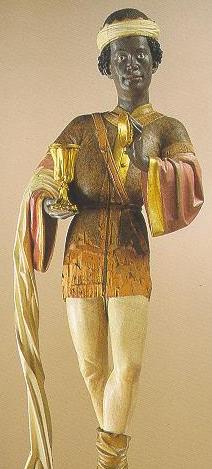|
 |
| Volume No. 1 Issue No. 28 - Friday, September 13, 2002 |
 Dr Edward Scobie Authority on the Presence of Africans in Britian Dr Edward Scobie Authority on the Presence of Africans in Britian
 by Thomson Fontaine by Thomson Fontaine

When Dr. Edwards Scobie died of heart complications, on November 14, 1996, in New York, his death was mourned
by many in Dominica and by thousands of people the world over.
At the time of his death, Dr. Scobie was Professor Emeritus at New York City University and had distinguished himself as a leading expert and authority on the presence of Africans in early Western Europe.
When in 1972, Britannia ; The History of Blacks in Britain was published by Johnson Press (Chicago and London), it was hailed as the defining account of the historical journey of Africans to that strange world.
Dr. Scobie distinguished himself as an authority in tracing the history of blacks as they made their way to Western Europe. In Britannia, he highlights the role of the many persons of African descent who gained positions of respect and a kind of glory on their merits. Today the book is a must read for students of history and is a key text in leading universities in England and throughout the world.
Born in Roseau, Dominica on 23rd May 1918, and named Vivian Edward George Dalrymple, he was educated at the Dominica Grammar School. An outstanding athlete,
he represented the National teams in cricket and football. During World War II, he left Dominica for England to join the Royal Air Force. He became a flight lieutenant and a pilot in Bomber Command flying sorties over Europe during World War II; and stayed on after
demobilization until the mid- sixties.
During that time, he worked as a journalist in London where he assumed the name Scobie. He became a correspondent for the Chicago Defender and for Ebony and Jet magazines. He contributed to many London newspapers, magazines and the wire services, and became a frequent broadcaster and scriptwriter for radio and television including British Broadcasting Services (BBC) Caribbean programs. From 1961 to 1963 he edited Flamingo, a monthly magazine published in London for African people in Britain, Africa and the Caribbean.
He returned to Dominica in the mid 1960s and quickly took over the editorship of the Dominica Herald from Phyllis Shand Allfrey who left to established her own paper, The Star in 1965. Along
with Stanley Boyd, editor of The Chronicle, they led a newspaper editor's protest at the passing of the "Prohibited and Undesirable Publications Act"
in July 1968.
As part of the group of Freedom Fighters, this led to the formation of the Dominica Freedom Party. Dr. Scobie became vice president of the party, which would come to dominate Dominican politics during the eighties and early nineties.
As an active participant in local politics, he served twice as Mayor of Roseau. By 1972 however, Dr. Scobie had become weary of the narrow confines of
local politics and the parochial attitudes in Dominica and moved to the United States to launch a new career in academia.
He taught first as an Associate Professor in the African-American and Political Science Departments at, Rutgers, the State University of New Jersey. He also taught at Princeton University and the City University NY.
In addition to Britannia, he wrote The Global African Presence, and was the author of numerous scholarly articles and historical essays on the subject, including a series
of five articles for the Journal of African Civilizations. In "The Chevalier de Saint-Georges," Dr. Scobie documented the life of the remarkable composer, conductor, violinist, swordsman, equestrian and soldier of eighteenth century France.
In another of these articles, "African Popes," he discussed the lives of the three African pontiffs: St. Victor I (189-199), St. Miltiades (311-314) and St. Gelasius I (492-496). Yet another contribution was called "The Black in Western Europe."
In "The Moors and Portugal's Global Expansion," Dr. Scobie noted that: "Not only did the Moors in their European conquests leave their learning, their culture and their arts. Their blood, the blood of Africa, was to remain and flow in the veins of many a European, be he aristocrat or commoner.
Finally, it is left now to investigate, in some detail, that culture which these Islamic sons of Africa left for the benefit of Europe, particularly Spain, and even more so, Portugal. It is this African cultural heritage, which set in motion the expansion of Europe.
In "African Women in Early Europe" Dr. Scobie reflected on African women and the ethnic composition of Europe's royal families, pointing out that: "One of the well-known examples of a member of royalty with the blood of Africa coursing in her veins was Queen Charlotte Sophia, German-born consort of the English King George III (1769-1820)... These facts of history have never been given exposure in the writings of Europeans for obvious racist reasons." Queen Charlotte Sophia was not only the wife of George III. She was the grandmother of Queen Victoria.
The comprehensive work, the African Presence in Early Europe, an anthology first published in New Brunswick, New Jersey by the Journal of African Civilizations in 1985, revised in 1993 and edited by Dr. Ivan Van Sertima, was dedicated to Dr. Scobie "in recognition of his pioneering work, over many years, in this long neglected field. Runoko Rashidi, himself a leading expert on African history has written several historical pieces in dedication to Dr. Scobie.
The Honorary Pallbearers at Dr. Scobie's mass were Dr. Jan Carew, Dr. Ivan Van Sertima, Dr. John Henrik Clarke, Bill Jones, Dr. Leonard Jeffries, Marcus Garvey Jr., Dr. Yosef A.A. ben-Jochannan and James Smalls.

|
 |  |
|
 |

|





